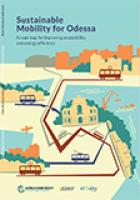Publications
With a population of 1 million, Odessa is the fourth most populous city in Ukraine. It is a port city and major tourist destination. While Odessa retains its rich heritage of an outward looking, commercial city, much of the form and function of the city was defined through soviet-era expansion in the latter half of the 20th century; this includes high-rise residential developments on the city periphery and an infrastructure heavy public transport system comprising tram and trolleybus. The benefits of this legacy include a high public transport mode share (46 percent of all trips), a large municipal operator, Odessagorelektrotrans (OGET), and dense residential areas that are well suited to public transport (PT).
However strategic planning and investment has suffered under the transition from a centrally planned economy towards a market lead approach. The City Administration is currently engaged in a project to improve the tram and trolleybus networks. This will the see the opening of the new north-south tram link in 2018 and the delivery of 10 new trams and 45 trolleybuses (with assistance from EIB/EBRD). Building on this success, the City has the ambition for wide-ranging improvements to achieve a step-change in provision of PT across the city. There is an urgent need to reorganize and restructure the PT network to align with the actual needs of the population through enhancement of the routes and quality of service provided by OGET as well as revising the model of private operations from the current atomized low quality and inefficient operations to sustainable high quality operations through market consolidation, competition for the market and regulation. The reorganization of the current network coupled with industry reform, and improvements to infrastructure and fleet will be necessary to improve the network efficiency both in terms energy consumption and services provided, supporting better financial stability and better mobility options and conditions for residents of Odessa.
This study has conducted a comprehensive assessment of the PT network in Odessa, involving the collection and analysis of PT demand and supply data, land-use and socio- economic data, focus groups, user needs surveys and stakeholder consultation. Special attention has been paid to understand the particular challenges encountered by specific groups of users, including women, disabled and the elderly. This information has been assessed to identify the root causes of under performance, the desires of the travelling public, opportunities for improvement and the administrative capacity for delivery and supported the preparation of an integrated strategy to improve PT provision in Odessa in the short, medium and long term.
Nunez, Antonio Benigno. 2018. Sustainable mobility for Odessa: a road map for improving accessibility and energy efficiency. Washington, D.C.: World Bank Group. http://documents.worldbank.org/curated/en/498021530861926262/Sustainable-mobility-for-Odessa-a-road-map-for-improving-accessibility-and-energy-efficiency
